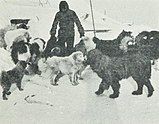Wikipedia:Main Page history/2022 August 23
From today's featured article
Did you know ...
- ... that Ardwall House (pictured) has a garden ornament in the form of an early mediaeval Pictish slab inscribed with a Celtic cross?
- ... that Henry Janzen was the first coach to lead his team to back-to-back Vanier Cup championships?
- ... that the main studio of a Cincinnati TV station occupies the one-time gymnasium of a former Black junior high school?
- ... that Juan José Cabezudo was a notorious gay chef and street-food seller in 19th-century Lima?
- ... that the area of responsibility of the 6th Military Police Group includes all of the United States west of the Mississippi River?
- ... that when the US government offered Bolivian president Gonzalo Sánchez de Lozada US$15 million to help quell riots in La Paz, he responded that with that he "couldn't even afford to pay for the cigars he smoked"?
- ... that telegraph operator Emma Hunter may have been the world's first electronic commuter?
- ... that a dead woman's knickers helped to solve the Charing Cross Trunk Murder?
In the news
- William Ruto (pictured) is elected President of Kenya.
- In Giza, Egypt, a church fire spreads to a nursery, killing 41 people, including at least 18 children.
- Salman Rushdie, author of The Satanic Verses, is critically injured after a stabbing at a speech in the United States.
- A mass fish kill occurs in the river Oder in Poland and Germany.
On this day
- 1873 – The Albert Bridge, spanning the River Thames in London, opened.
- 1898 – The Southern Cross Expedition (dogsled team pictured), the first British venture of the Heroic Age of Antarctic Exploration, departed London.
- 1989 – Singing Revolution: Approximately two million people joined hands to form a human chain spanning 675.5 kilometres (419.7 mi) across the Estonian, Latvian and Lithuanian Soviet republics to demonstrate their desire for independence.
- 2010 – A former Philippine National Police officer hijacked a tourist bus in Manila, holding its occupants hostage for nearly eleven hours and killing eight of them before being killed by police himself.
- Isabella of Aragon, Queen of Portugal (d. 1498)
- John Sherman Cooper (b. 1901)
- Jeremy Lin (b. 1988)
Today's featured picture

|
The Goldfinch is an oil-on-panel painting by the Dutch Golden Age artist Carel Fabritius of a life-sized chained goldfinch. Signed and dated 1654, it is now in the collection of the Mauritshuis in The Hague, Netherlands. The work is a trompe-l'œil painting that was once part of a larger structure, perhaps a window jamb or a protective cover. It is possible that the work was in Fabritius's studio in Delft at the time of a large gunpowder explosion on 12 October 1654 that killed him and destroyed much of the city. A common and colourful bird with a pleasant song, the goldfinch was a popular pet, and could be taught simple tricks including lifting a thimble-sized bucket of water. It was reputedly a bringer of good health, and was used in Italian Renaissance painting as a symbol of Christian redemption and the Passion of Jesus. The Goldfinch is unusual for the Dutch Golden Age painting period in the simplicity of its composition and use of illusionary techniques. Following the death of its creator, it was lost for more than two centuries before its rediscovery in Brussels. Painting credit: Carel Fabritius
Recently featured:
|
Other areas of Wikipedia
- Community portal – The central hub for editors, with resources, links, tasks, and announcements.
- Village pump – Forum for discussions about Wikipedia itself, including policies and technical issues.
- Site news – Sources of news about Wikipedia and the broader Wikimedia movement.
- Teahouse – Ask basic questions about using or editing Wikipedia.
- Help desk – Ask questions about using or editing Wikipedia.
- Reference desk – Ask research questions about encyclopedic topics.
- Content portals – A unique way to navigate the encyclopedia.
Wikipedia's sister projects
Wikipedia is written by volunteer editors and hosted by the Wikimedia Foundation, a non-profit organization that also hosts a range of other volunteer projects:
-
Commons
Free media repository -
MediaWiki
Wiki software development -
Meta-Wiki
Wikimedia project coordination -
Wikibooks
Free textbooks and manuals -
Wikidata
Free knowledge base -
Wikinews
Free-content news -
Wikiquote
Collection of quotations -
Wikisource
Free-content library -
Wikispecies
Directory of species -
Wikiversity
Free learning tools -
Wikivoyage
Free travel guide -
Wiktionary
Dictionary and thesaurus
Wikipedia languages
This Wikipedia is written in English. Many other Wikipedias are available; some of the largest are listed below.
-
1,000,000+ articles
-
250,000+ articles
-
50,000+ articles



